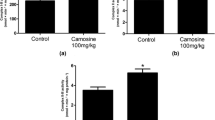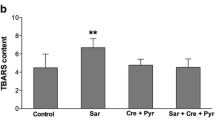Abstract
In the present study we investigated the effect of acute hyperprolinemia on some parameters of energy metabolism, including the activities of succinate dehydrogenase and cytocrome c oxidase and 14CO2 production from glucose and acetate in cerebral cortex of young rats. Lipid peroxidation determined by the levels of thiobarbituric acid-reactive substances, as well as the influence of the antioxidants α-tocopherol plus ascorbic acid on the effects elicited by Pro on enzyme activities and on the lipid peroxidation were also evaluated. Wistar rats of 12 and 29 days of life received one subcutaneous injection of saline or proline (12.8 or 18.2 μmol/g body weight, respectively) and were sacrificed 1 h later. In another set of experiments, 5- and 22-day-old rats were pretreated for a week with daily intraperitoneal administration of α-tocopherol (40 mg/kg) plus ascorbic acid (100 mg/kg) or saline. Twelve hours after the last injection, rats received one injection of proline or saline and were sacrificed 1 h later. Results showed that acute administration of proline significantly reduced cytochrome c oxidase activity and increased succinate dehydrogenase activity and 14CO2 production in cerebral cortex, suggesting that Pro might disrupt energy metabolism in brain of young rats. In addition, proline administration increased the thiobarbituric acid-reactive substances levels, which were prevented by antioxidants. These findings suggest that mitochondrial dysfunction and oxidative stress may be important contributors to the neurological dysfunction observed in some hyperprolinemic patients and that treatment with antioxidants may be beneficial in this pathology.






Similar content being viewed by others
References
Bavaresco CS, Streck EL, Netto CA, Wyse ATS (2005) Chronic hyperprolinemia provokes a memory deficit in the Morris water maze task. Metab Brain Dis 20:73–80
Beal MF (2005) Mitochondria take center stage in aging and neurodegeneration. Ann Neurol 58:495–505
Blass JP (2001) Brain metabolism and brain disease is metabolic deficiency the proximate cause of Alzheimer dementia. J Neurosci Res 66:851–856
Bose R, Schnell CP, Pinsky C, Zitko V (1992) Effects of excitotoxins on free radical indices in mouse brain. Toxicol Lett 60:211–219
Bubber P, Haroutunian V, Fisch G, Blass JP, Gibson GE (2005) Mitochondrial abnormalities in Alzheimer brain: mechanistic implications. Ann Neurol 57:695–703
Cáceda R, Gamboa JL, Boero JA, Monge-C C, Arregui A (2001) Energetic metabolism in mouse cerebral cortex during chronic hypoxia. Neurosci Lett 301:171–174
Cadenas E, Davies KJA (2000) Mitochondrial free radical generation, oxidative stress and aging. Free Radic Biol Med 29:222–230
Capaldi RA (1995) Structure and function of cytochrome c oxidase. Ann Rev Biochem 59:418–427
Chen J, Petersen DR, Schenker S, Henderson GI (2000) Formation of malondialdehyde adducts in liver of rats exposed to ethanol: role in ethanol-mediated inhibition of cytochrome c oxidase. Alcohol Clin Exp Res 24:544–552
Chen J, Henderson GI, Freeman GL (2001) Role of 4-hydroxynonenal in modification of cytochrome c oxidase in ischemia/reperfused rat heart. J Mol Cell Cardiol 33:1919–1927
Delwing D, Bavaresco CS, Chiarani F, Wannmacher CMD, Wajner M, Dutra-Filho CS, Wyse ATS (2003a) In vivo and in vitro effects of proline on some parameters of oxidative stress in rat brain. Brain Res 991:180–186
Delwing D, Bavaresco CS, Wannmacher CMD, Wajner M, Dutra-Filho CS, Wyse ATS (2003b) Proline induces oxidative stress cortex of rats. Int J Dev Neurosci 21:105–110
Delwing D, Chiarani F, Delwing D, Bavaresco CS, Wannmacher CMD, Wajner M, Wyse ATS (2003c) Proline reduces acetylcholinesterase activity in cerebral cortex of rats. Metab Brain Dis 18:79–86
Delwing D, Chiarani F, Bavaresco CS, Wannmacher CM, Wajner M, Dutra-Filho CS, Wyse AT (2005) Protective effect of antioxidants on brain oxidative damage caused by proline administration. Neurosci Res 52:69–74
Delwing D, Bavaresco CS, Monteiro SC, Matté C, Netto CA, Wyse AT (2006) Alpha-tocopherol and ascorbic acid prevent memory deficits provoked by chronic hyperprolinemia in rats. Behav Brain Res 168:185–189
Delwing D, Delwing D, Chiarani F, Kurek AG, Wyse AT (2007a) Proline reduces brain cytochrome c oxidase: prevention by antioxidants. Int J Dev Neurosci 25:17–22
Delwing D, Delwing D, Sanna RJ, Wofchuck S, Wyse ATS (2007b) Proline promotes decrease in glutamate uptake in slices of cerebral cortex and hippocampus of rats. Life Sci 81:1645–1650
Dutra-Filho CS, Wajner M, Wannmacher CM, Gassen E, Candiago RH, Wilhelms AM, de Malfussi HF (1995) 2-Hydroxybutyrate and 4-hydroxybutyrate inhibit CO2 formation from labeled substrates by rat cerebral cortex. Biochem Soc Trans 23:228S
Erecinska M, Cherian S, Silver IA (2004) Energy metabolism in mammalian brain during development. Prog Neurobiol 73:397–445
Fighera MR, Queiros CM, Stracke MP, Brauer MC, Gonzales-Rodrigues LL, Frussa-Filho R, Wajner M, Mello CF (1999) Ascorbic acid and alpha-tocopherol attenuate methylmalonic acid induced convulsions. Neuroreport 10:2039–2043
Fischer JC, Ruitenbeek W, Berden JA, Trijbels JM, Veerkamp JH, Stadhouders AM, Sengers RC, Janssen AJ (1985) Differential investigation of the capacity of succinate oxidation in human skeletal muscle. Clin Chim Acta 153:23–26
Flynn MP, Martin MC, Moore PT, Stafford JA, Fleming GA, Phang JM (1989) Type II hyperprolinemia in a pedigree of Irish travelers (nomads). Arch Dis Child 64:1699–1707
Gronow GHJ, Cohen JJ (1984) Substrate support for renal functions during hypoxia in the perfused rat kidney. Am J Physiol 247:F618–F631
Gupta RC, Milatovic D, Dettbarn WD (2002) Depletion of energy metabolites following acetylcholinesterase inhibitor-induced status epilepticus: protection by antioxidants. Neurotoxicology 22:271–282
Heales SJ, Bolaños JP, Stewart VC, Brookes PS, Land JM, Clark JB (1999) Nitric oxide, mitochondria and neurological disease. Biochim Biophys Acta 1410:215–28
Kessler A, Costabeber E, Dutra-Filho CS, Wyse ATS, Wajner M, Wannmacher CMD (2003) Proline reduces creatine kinase activity in the brain cortex of rats. Neurochem Res 28:1175–1180
Lowry OH, Rosebrough NJ, Farr AL, Randall RJ (1951) Protein measurement with the Folin phenol reagent. J Biol Chem 193:265–267
Milatovic D, Zivin M, Gupta RC, Dettbarn WD (2001) Alterations in cytochrome c oxidase activity and energy metabolites in response to kainic acid-induced status epilepticus. Brain Res 31:67–78
Navarro A, Gómez C, Sánchez-Pino MJ, González H, Bández MJ, Boveris AD, Boveris A (2005) Vitamin E at high doses improves survival, neurological performance and brain mitochondrial function in aging male mice. Am J Physiol Regul Integr Comp Physiol 289:R1392–R1399
Nelson DL, Cox MM (2008) Lehninger principles of biochemistry. W.H Freeman and Company, New York
Nunomura A, Castellani RJ, Zhu X, Moreira PI, Perry G, Smith MA (2006) Involvement of oxidative stress in Alzheimer disease. J Neuropathol Exp Neurol 65:631–641
Ohkawa H, Ohishi N, Yagi K (1979) Assay for lipid peroxides in animal tissues by thiobarbituric acid reaction. Anal Biochem 95:351–358
Parker WD Jr, Parks J, Filley CM, Kleinschmidt-DeMasters BK (1994) Electron transport chain defects in Alzheimer’s disease brain. Neurobiology 44:1090–1096
Petrozzi L, Ricci G, Giglioli NJ, Siciliano G, Mancuso M (2007) Mitochondria and Neurodegeneration. Biosci Rep 27:87–104
Phang JM, Hu CA, Valle D (2001) Disorders of proline and hydroxyproline metabolism. In: Scriver CR, Beaudet AL, Sly WS, Valle D (eds) The metabolic and molecular bases of inherited disease. McGraw-Hill, New York, pp 1821–1838
Pisarenko OI (1996) Mechanisms of myocardial protection by amino acids: facts and hypotheses. Clin Exp Pharmacol Physiol 23:627–633
Pontes ZL, Oliveira LS, Bavaresco CS, Streck EL, Dutra-Filho CS, Wajner M, Wannmacher CMD, Wyse ATS (1999) Proline administration decreases Na+, K+-ATPase activity in the synaptic plasma membrane from cerebral cortex of rats. Metab Brain Dis 14:265–272
Pontes ZL, Oliveira LS, Franzon R, Wajner M, Wannmacher CMD, Wyse ATS (2001) Inhibition of Na+, K+-ATPase activity from rat hippocampus by proline. Neurochem Res 26:1321–1326
Rustin P, Chretien D, Bourgeron T, Gérard B, Rötig A, Saudubray JM, Munnich A (1994) Biochemical and molecular investigations in respiratory chain efficiencies. Clin Chim Acta 228:35–51
Schurr A (2002) Energy metabolism, stress hormones and neural recovery from cerebral ischemia/hypoxia. Neurochem Int 41:1–8
Sharpe MA, Cooper CE (1998) Interactions of peroxynitrite with mitochondrial cytochrome oxidase. Catalytic production of nitric oxide and irreversible inhibition of enzyme activity. J Biol Chem 273:30961–30972
Vatassery GT (1998) D. Geriatrics 53(Suppl. 1):S25–S27
Vatassery GT, DeMaster EG, Lai JCK, Smith WE, Quach HT (2004) Iron uncouples oxidative phosphorylation in brain mitochondria isolated from Vitamin E-deficient rats. Biochim Biophys Acta 1688:265–273
Weinberg JM, Venkatachalam MA, Roeser NF, Nissim I (2000) Mitochondrial dysfunction during hypoxia/reoxygenation and its correction by anaerobic metabolism of citric acid cycle intermediates. Proc Natl Acad Sci USA 97:2826–2831
Wyse ATS, Zugno AI, Streck EL, Matte C, Calcagnotto T, Wannmacher CMD, Wajner M (2002) Inhibition of Na+, K+-ATPase activity in hippocampus of rats subjected to acute administration of homocysteine is prevented by Vitamins E and C treatment. Neurochem Res 27:1685–1689
Acknowledgments
This work was supported in part by grants from Conselho Nacional de Desenvolvimento Científico e Tecnológico (CNPq – Brazil), FINEP Research Grant “Rede Instituto Brasileiro de Neurociência (IBN-Net)—Proc. No 01.06.0842-00”, and “Instituto Nacional de Ciência e Tecnologia (INCT) para Excitotoxicidade e Neuroproteção (INCT/CNPq)”.
Author information
Authors and Affiliations
Corresponding author
Rights and permissions
About this article
Cite this article
Ferreira, A.G.K., Lima, D.D., Delwing, D. et al. Proline impairs energy metabolism in cerebral cortex of young rats. Metab Brain Dis 25, 161–168 (2010). https://doi.org/10.1007/s11011-010-9193-y
Received:
Accepted:
Published:
Issue Date:
DOI: https://doi.org/10.1007/s11011-010-9193-y




